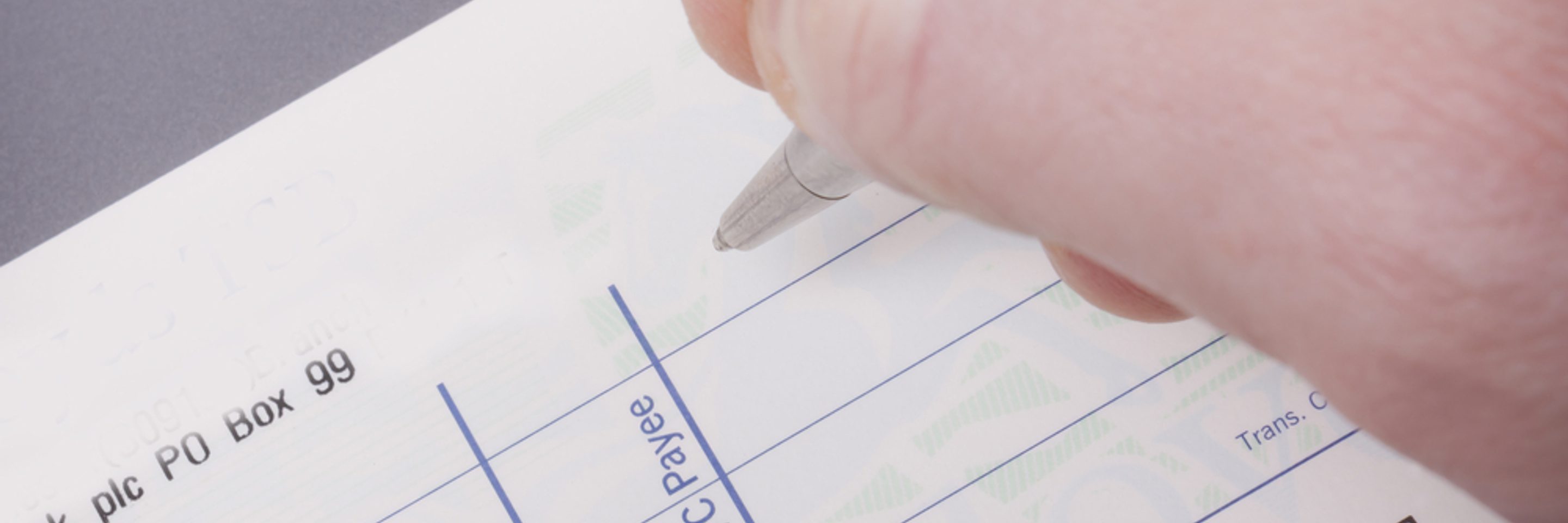
E-day, which arrived on Friday 19th September 2014, could mark the beginning of the end for cheques in Ireland. In September 2013, the Central Bank launched its National Payments Plan (NPP) which is aimed at increasing the use of electronic forms of payments within the Irish economy. From 19th September 2014 Government Departments, Local Authorities and State Agencies, including the Revenue Commissioners, will no longer accept or issue cheques when dealing with Irish businesses. Ireland currently lags behind its European peers, with cheque payments still accounting for over 75% of business transactions. It is expected that savings of up to €1 billion per annum can be achieved for the Irish economy through the introduction of electronic forms of payment such as debit cards, credit cards and electronic banking.
While this may be a change for Irish businesses it is a change for the better. The cost of writing a cheque can include stamp duty of .50c per cheque, processing charges of .39c and postage costs of almost .60c. When these are taken into account the cost to your business is an additional €1.49 per cheque.
Benefits of Electronic Payments
As you can see from the above the use of cheques can prove very costly however, despite this Irish businesses are still writing up to 39 million cheques per year. While this figure is reduced from the 2012 figure of 49.5 million cheques, Ireland still issues significantly more cheques than our European competitors. Making the switch to electronic payments can however have a number of positive impacts for your business which include the following:
1. Improved Cashflow
Accepting e-payments from customers will ensure that payments are made directly to your bank account and could shorten your cash collection cycle by up to 30 days. The recent introduction of SEPA also improves receipt of payments from businesses outside of Ireland, as these will now be processed as quickly as domestic payments, again decreasing your cash collection cycle.
2. Decrease in late payment from customers
As a business owner you have no doubt heard the line "The cheque is in the post". This is the most common excuse for late payment by customers. Such late payments will have a negative impact on cashflow as in addition to waiting for the cheque to “arrive in the post”, once the cheque arrives you will then have to wait for the cheque to clear, which could take up to 5 working days. The introduction of e-payment facilities for your business will allow your customers to make payments directly to your bank account, thus reducing the number of late payments.
3. Time Saving
As outlined above the issuing of cheques could cost a business up to €1.49 per cheque, and this does not even factoring in the time taken to write the cheque, draft a letter to accompany the cheque and bring the letter to the post box. In addition, you will need to factor in the time it takes for an employee to queue in the bank and lodge the cheques, with some businesses reporting that this could take an employee up to an hour per day to complete.
4. Reduction in Fraud Risk
By accepting e-payments from customers it reduces the level of cheques and cash being handled by your business on a day to day basis. With payments being paid directly into your bank account there is less scope for theft and therefore security requirements for the business can be reduced. Fraud can also be reduced and efficiencies obtained within your bookkeeping function, as some accounting packages now have a facility where your bank transactions can be directly linked to your bookkeeping software. One such system which is used by our offices is Xero. This software links your bank account with the bookkeeping software, thus reducing the time taken to process your books and records.
5. Meet customer demand
As Irish customers are very familiar with electronic methods of payment it is important that as a business you are ready to meet your client’s demands. If your business is not ready to accept e-payment from your customers they may seek an alternative supplier that can offer such a service.
Government No Longer Accepting Cheques
The National Payment Plan introduced by the Central Bank in April 2013 had three principal targets:
- Double the number of e-payments
- Greatly improve the efficiency of the Irish cash cycle
- Ensure successful transitions of retail electronic payments to SEPA standards.
To ensure the NPP is successful in achieving the above targets from 19th September 2014 (E-Day) Government Agencies, Local Authorities and State agencies will no longer use cheques in their dealings with Irish businesses. The aim of this initiative is to encourage SME’s to migrate from cheques to electronic payments of methods. While the Revenue Commissioners have been very pro-active over the past 12 months in switching to e-payments, businesses who deal with Government Agencies (Department of Health, Department of Jobs, Enterprise and Innovation, etc.) or Local Authorities will also need to ensure that they have put the necessary arrangements in place for accepting or making electronic payments with such Government bodies.

